National Futurism
 The past two centuries have been defined by States making war against each other and their own people. Internal squabbles, between a group that wants a strong state and a group that wants near anarchy, have paralyzed our governments. We circle around the same issue, never solving it.
The past two centuries have been defined by States making war against each other and their own people. Internal squabbles, between a group that wants a strong state and a group that wants near anarchy, have paralyzed our governments. We circle around the same issue, never solving it.
This shows us the importance of the nation — a group united by ties of heritage, language, culture, customs, cuisine, religion and values — in sustaining the nation-state. While the nation-state is not ideal, if it is supported by the nation, it has a goal and standards. Without those, it becomes the lapdog of business and special interests.
When a nation-state has homogeneity, experiences internal harmony. When the nation-state stuffers diversity/multiculturalism of any kind, it leads to a depressing disintegration of social values. While this seems unexciting to our minds saturated in media that in its zeal for the new values anything “different” over even the logical and reliable, we do well to remember Aesop’s words: “Better cheese and olives in peace rather than wine and cakes in hell.”
I propose a new philosophy called National Futurism. The basic concept is that we recognize the need for eternal ideas, like nationalism and the shared values it allows us to have, in the context of moving toward the future. We should not abandon technology, our powerful modern society, or all we have learned. But we should not disregard the wisdom of the past, either.
The principles of National Futurism:
- A nation is comprised of two components: Culture and Race. Culture is based on language, religion, customs, cuisine and values. Race is the biological appearance of a group of people with common blood. The two are inextricably linked. Domestic policy must create a state for and by a certain ethnic group who in turn rule this state. This state must also serve the needs of this ethnic groups needs and only this ethnic group.
- Geo-political policy asserts the right of a state to pursue its own interests alone. We must go to war if necessary for our interests and dignity and for the common good. We must value peace if it is in our interests only.
- The domestic policy is that the state must serve the people and only them. This will be done with a rigorous policy of scientific development. The ideology proposes a scientific program to cure the nation of all of its problems like land settlement and medical complicationss. Also new scientific development could bring more colonial land in space and also in the desert. The state must be based on three pillars: national culture, scientific prowess and military knowledge.
- Education is both the end of the state or the rise of it. The state must have total control of the teaching system so that no foreign influences can come and infect children as happens in America. It must be state supervised and teach ethics and morals, in addition to a rigorous program of scientific education.
- Environmentalism is a fundamental part of National Futurism. We must not be sustanists. We serve mother nature not the monetary value of objects in nature. We must respect natural things because of nature itself. A national futurist state, using advancements in science, will replaced oil-based consumerist excess with a solar energy empire dedicated to precise use of resources.
- We must mix autocracy with democracy because both at extremes corrupt the state. We must have a head of state that can lead and give us total leadership; he must have advisers who must be elected for life, like their leader. In addition to officers for each locality, there must be officers for each function of the nation such as health, security, education and science. The leader must be strong in character and must have proved himself before becoming a leader.
- To save the nation and her people one must save the family and its values. Family must be big so the state is big and the children defend the state form invasion and work for the state someday. This is seen in rural Egypt: a farmer of modest wealth will have 13 children so he can have enough workers for the farms. Also to defend the state.
National Futurism can best be understood through the art it would produce. Its concept would be “the best of both worlds”: the free will of modern art with the professionalism of Renaissance art. Traditional icons (Ra, Seth, Odin, Thor, Freja, Christ, Virgin Mary) are expressed in a fresh new technique with new ideals and techniques. Art — poetry, sculpture, music, image and film — should be more than decoration; it explains the state. National Futurism is the wisdom of the past thrust forth into the future by knowledge.
A National Futurist state would be an antidote to a dying time. Modern art is bad or incompetent because it expresses nothing other than the hollow individualism of the artist, and a belief that the world is fundamentally distorted and cannot be changed. Romantic art is incomplete because it is past-focused. National Futurist art merges the two to make a movement headed toward the future.
Ideas if pure can have large flaws; only if you marry ideas can the result have a chance of being a strong, rugged phenomena. Futurism with its progressive tone, optimism of the coming years and scientific light merges with nationalism and its blithe traditionalism, pride which kills the nihilistic tone of today and sense of values. Together these two fragmentary ideas make a complete one.









